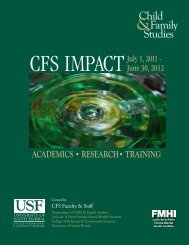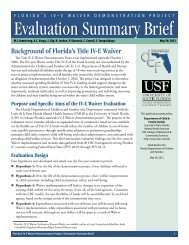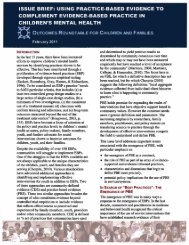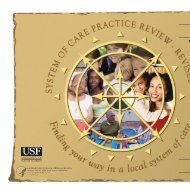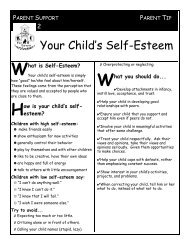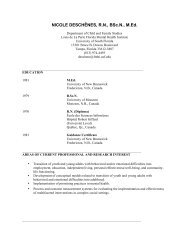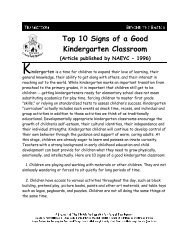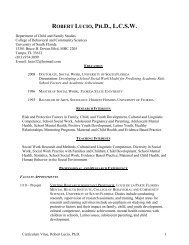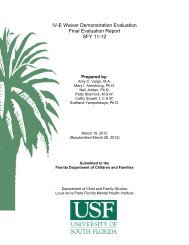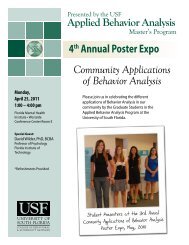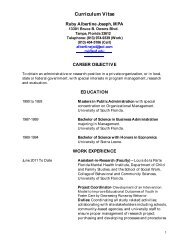The Early Learning Opportunities (ELO) Act - Child & Family Studies
The Early Learning Opportunities (ELO) Act - Child & Family Studies
The Early Learning Opportunities (ELO) Act - Child & Family Studies
You also want an ePaper? Increase the reach of your titles
YUMPU automatically turns print PDFs into web optimized ePapers that Google loves.
Evaluation of the <strong>Early</strong> <strong>Learning</strong> <strong>Opportunities</strong> <strong>Act</strong><br />
“[Describing what she liked] <strong>The</strong> excitement of books, literacy, their writing skills,<br />
name recognition, actually being able to formulate a lot of letters. Having those<br />
writing materials at all the centers. <strong>The</strong> kids really adapt to that and [are] really<br />
excited…”<br />
“When they have free choice time, normally they just go to the housekeeping.<br />
[Now] they actually go to the books. <strong>The</strong>y enjoy reading books now. <strong>The</strong>y pick it<br />
up and ask you questions about the books.”<br />
“I didn’t realize that even at a two year old level they could still grasp what three<br />
and four year olds would grasp and they picked up on it. In a week or two period,<br />
they were actually able to say and do things that three and four year olds were<br />
doing, and I was amazed. . . .”<br />
“I have one year olds whose language has just taken off since I started this<br />
[course]. <strong>The</strong>y are counting to five, reciting their ABC’s . . . they are picking up<br />
what I am doing with my older children . . . and they are getting it.”<br />
Parent feedback following participation in behavior component<br />
From another perspective, child and family outcomes following participation in the home<br />
visiting model were examined by their progress toward meeting their individualized targeted<br />
goals. Table 19 contains the goals for each of the eight children and their families along with the<br />
outcomes that were described collectively by the families and their respective <strong>Early</strong> <strong>Child</strong>hood<br />
Consultants. In general, attainment of the targeted goals was obtained; however, in many cases<br />
additional goals and behaviors of concern were identified for future intervention.<br />
Table 19<br />
Targeted Goals and Outcomes for the Home Visiting Model<br />
Goal<br />
Increase compliance. Decrease physical aggression,<br />
demanding attention, whining and yelling and work on<br />
bedtime schedule/routines.<br />
Increase compliance. Decrease temper tantrums,<br />
demanding attention, yelling, smart talk, ignoring, and<br />
whining.<br />
Decrease head banging, temper tantrums, demanding<br />
attention, physical attacks towards others, ignoring, and<br />
whining. Increase compliance and bathroom skills.<br />
Decrease whining/crying, smart talk, and demanding<br />
attention. Increase compliance and adherence to bedtime<br />
routines.<br />
Increase social cooperation and compliance with<br />
mealtime routines. Decrease tantrums and aggression.<br />
Decrease whining and ignoring. Increase compliance and<br />
improve social skills.<br />
Decrease whining, destructive behaviors, smart talk,<br />
ignoring, temper tantrums. Increase compliance and<br />
adherence to bedtime routine.<br />
Outcome<br />
Parents reported an increase in compliance and<br />
decrease in yelling.<br />
Mother believed that medications combined with behavior<br />
modification and counseling worked well in improving<br />
behavior. She wanted to continue behavioral strategies<br />
and work on fine motor skill development.<br />
Mother demonstrated consistency with strategies such as<br />
praising and noticing desired behaviors. Mom noted that<br />
strategies helped with all four children<br />
Parents stated that they are enjoying their child more.<br />
Parents report major improvements with behavior. No<br />
hitting and sleeping in own bed. Parents were<br />
enthusiastic and demonstrated consistent use of new<br />
strategies.<br />
Unsuccessful completion.<br />
Although still described as fidgety and unable to attend,<br />
teacher noted that the child was more social with adults<br />
and peers.<br />
Louis de la Parte Florida Mental Health Institute, University of South Florida – page 34



